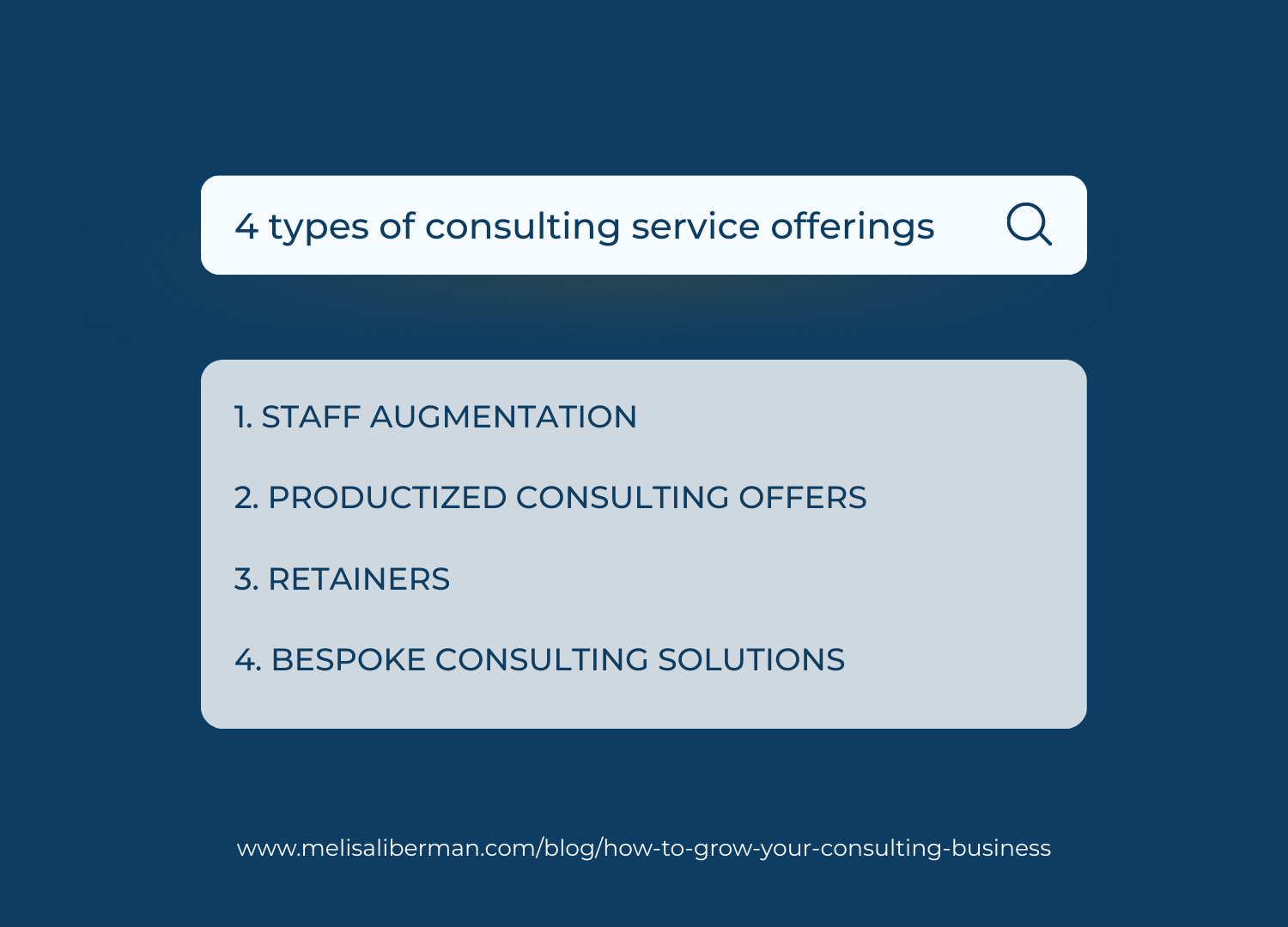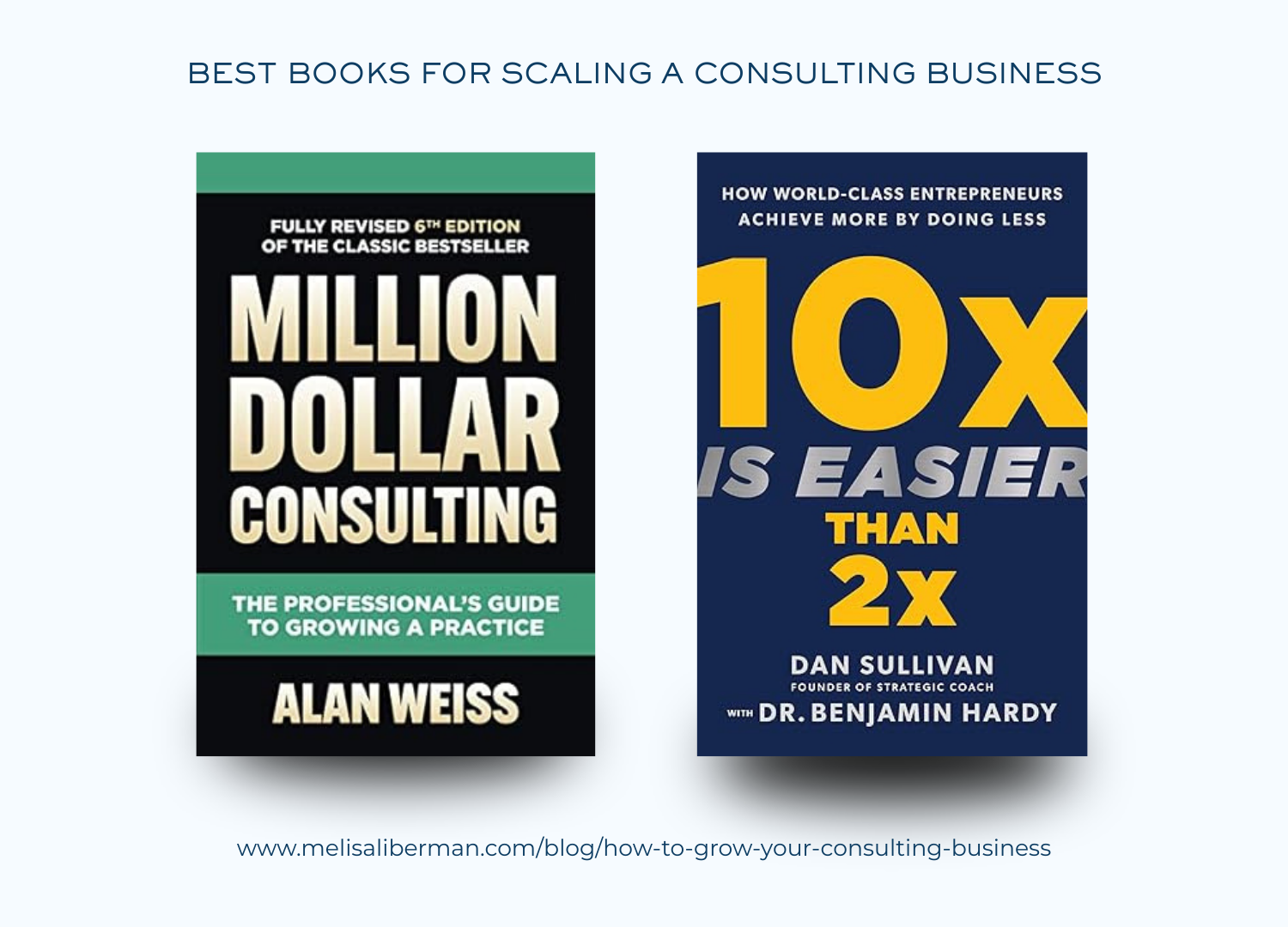How To Grow Your Consulting Business: Top Scaling Tips
Dec 07, 2025
Estimated Reading Time: 21 minutes
Download the article as a PDF:

Quick links
- What you will learn in this article
- How does growth compare to scaling?
- What are the different models for scaling a consulting business?
- How to grow your consulting business
- How to scale your consulting business
- What are the best books for scaling a consulting business?
- Get expert help to grow your consulting business
What you will learn in this article
Do you have a goal to grow your consulting business?
You want to make more money.
You want to increase your impact and fulfillment.
And, you want to achieve these goals while at the same time having more flexibility with your schedule.
This is the holy grail for any consulting business owner.
Does this sound familiar to you too?
If you’re like most consultants, you’re not sure how to accomplish this consulting holy grail where you’re making more money, having more impact, and also having more flexibility and autonomy.
You haven’t figured out the formula to grow your consulting business without creating an overly complicated, hard-to-manage, hard-to-sustain business where your revenue is tied to the number of hours you work.
In this blog, I share the formula to grow your independent consulting business in a scalable way, so you’re able to have it all - more money, more time, and more impact.
How does growth compare to scaling?
But first, before we dive in, it’s important to differentiate growth from scaling and vice versa.
So many consultants confuse growth for scaling.
It’s common to use these two terms interchangeably even though doing so isn’t accurate.
Forbes describes scalability as the ability of a company to increase its qualitatively constant output or revenue without the input resources or costs increasing to the same extent.
An article in Harvard Business Review describes the growth and scaling concepts in a straightforward way. Growth means adding revenue at the same pace you are adding resources (including time and people); scaling means adding revenue at a much greater rate than cost.
Now that we’re on the same page, let’s dive into the article I’ve written for you.
What are the different models for scaling a consulting business?
When you think about scaling your consulting business, there are several considerations. Specifically, you’ll want to get clear on the types of services you’ll deliver as you grow, your pricing for those services, and how you deliver the consulting services you sell.
What you deliver
The first consideration for scaling your consulting business is to think about the types of services you’ll deliver.
There are several types of consulting service offerings, and each has pros and cons when it comes to scaling.

1. Staff augmentation
Staff augmentation is when you’re working as an extra pair of hands or a pseudo-employee for your client. For more on the difference between contractors and consultants, read my article on the Pros and Cons of Independent Consultant vs. Contractor.
To grow your consulting business when you’re using a staff augmentation model, you’ll need to increase your rates and/or increase the number of hours you (and/or subcontractors) are working.
The staff augmentation model is the most familiar to most consultants and consulting buyers. As a result, it can be the fastest to sell and begin billable work.
The con of the staff augmentation model is that it doesn’t scale after you’ve maxed out the number of hours you’re willing to work and the maximum bill rate a client is willing to pay.
2. Productized consulting offers
A relatively easy and scalable way to grow your consulting business is to productize some or all of your consulting offers. For example, you might offer shorter duration, higher impact type engagements such as:
- Strategy projects
- Executive alignment
- Roadmaps
- Conversion planning
- Assessments
- Implementation plans
Productized offerings can be straightforward to sell and deliver. They can also be an effective way to get your foot in the door at your ideal corporate client.
You can charge for them in a value-based pricing model where the amount you charge isn’t tied to the amount of time you take to deliver the consulting service. In this consulting pricing model, you’re able to charge for your accumulated expertise and knowledge and ultimately a portion of the value your clients realize through the work you do.
On the flip side, to look at the cons with productized consulting offers, some consultants find themselves bored after a while because the variety of work can be more limited.
Also, this type of consulting offer can require more frequent business development and selling (which most consultants don’t enjoy) because the model often involves doing more, quick-turnaround type projects.
3. Retainers
Offering consulting retainers is another scalable way to grow your consulting business, especially when the retainers are advisory in nature and aren’t tied to the number of hours you’re spending for the client.
If you add several retainer clients to your consulting client roster, you’ll have a recurring revenue stream that provides a solid financial foundation and financial predictability.
While retainers can be challenging to sell to brand new customers, unless you have already built a reputation in your industry for what you do, the retainers can be much easier to sell to existing and past clients who know you and trust your guidance and expertise.
Here are three (3) retainer resources for consultants:
- Listen to podcast Episode #111: Roadmap to Advisory Retainers for Independent Consultants
- Take the Retainer Readiness Assessment
- Read more about How Independent Consultant Rates and Retainer Fees Work
4. Bespoke consulting solutions
Another way to grow your consulting business is to deliver bespoke, customized consulting solutions. These solutions typically have a longer sales cycle and can be more challenging to navigate through the budgetary and business approval processes.
They can also be very lucrative, commonly ranging from $250k to $3M+ in size.
If you’re able to develop your sales skills to the point of successfully navigating through these large contracts, you’d only need to land one to four of these contracts a year to grow into a $1M+ revenue consulting business.
What you charge for consulting services
Another lever to scale your consulting business is to shift the way you price your consulting services.
If you’re charging based on time, such as by the hour or by the day, you have a natural ceiling on the amount of revenue you can generate.
When you charge based on the hour, you put a cap on the amount of money you can make.
To scale, transition into non-time-based models such as project-based pricing or value-based pricing. This means you’re charging based on the value to the end client as opposed to the amount of time you spend delivering for the client.
For more on value-based pricing,
- Listen to Episode 086 of the Grow Your Independent Consulting Business podcast - Overcoming Value-Based Pricing Fear
- Read the article on How Independent Consultant Rates and Retainer Fees Work
How you deliver consulting services
Another lever to scale your consulting business is to shift the way you sell and deliver your consulting services.
If you want to grow your consulting business in a scalable way where you’re not working more to earn more, you can consider alternative delivery models, such as engaging subcontractors, hiring employees, or teaming with other consultants.
It can be beneficial to bring on supporting resources to increase your capacity and free up your time to manage the more strategic, lucrative type of consulting work. These resources can be billable or non-billable.
The drawback of changing out of a solo consultant model to a micro-consulting, or boutique consulting firm is that you’ll have additional resources that you’ll need to manage and pay.
For additional resources on delivery models,
- Read the article on How To Create A Consulting Business Plan (Incl. Free Template)
How you run your consulting business
Your time is one of your greatest assets. The way you use your time is vital to your successful growth and scaling. If you're swamped handling low-value activities (e.g. invoicing, keeping track of your leads, trying to remember when to follow-up with someone, doing your bookkeeping, etc.), you're wasting this asset.
Look at all of the ways you're using your time and identify areas where you can (1) delegate to resources such as an executive or administrative assistant, (2) streamline or automate using tools for a consulting business, or even (3) eliminate the tasks altogether.
For example, a CRM can help your independent consulting business grow by systematizing your consulting lead generation and consulting sales processes. When your sales processes are systematized, it’s more likely you’ll take consistent action and reap the benefits of this consistency in the form of a larger, more robust pipeline of consulting clients. A CRM will prompt you to take small, consistent actions to build and nurture your network and audience of potential consulting clients, referrers, and collaborators so you stay top of mind, uncover consulting opportunities, and maintain a consistent pipeline of consulting leads.
How to grow your consulting business
To grow your consulting business, you’ll want to focus on creating a repeatable, predictable process for filling and maintaining your pipeline of potential clients.
How do I get clients for my consulting business?
The best way to get clients for your consulting business is to build a consistent, effective lead generation and to be clear on all the steps of your sales process so you’re leading potential clients through to a signed contract and not depending on the client or a third party to sell work for you.
Consulting lead generation
Successful consultants develop and implement a lead generation process that’s easy to execute for them and that resonates with their ideal target consulting clients.
Then, they consistently execute that routine, even when they’re busy with client work and other responsibilities.
For more on how to successfully generate leads for your consulting business read the article The Ultimate Guide to Lead Generation for Consultants
Business owner routine
Many consultants make the mistake of deferring their lead generation tasks and activities when they’re busy. They think they don’t need to generate leads because they’re already fully utilized. Or, they think they have plenty of time before their contract ends and will wait until that roll-off date is closer.
This is employee thinking.
In other words, you’re thinking like an employee who’s too busy to take on more work, and you think the solution is to wait until you have more availability or until priorities change.
This way of thinking likely worked well for you as an employee.
But, as a consulting business owner, it will backfire.
Thinking that lead generation is more of a “just-in-time” type activity instead of an ongoing necessity for a business owner will set you up to experience the dreaded consulting feast-or-famine cycles.
Alternatively, you’ll want to create a repeatable, easy-to-execute lead generation routine that results in you consistently initiating and building relationships with potential consulting clients, people and companies who would refer clients to you, and potential subcontractors who could help execute the work in times when you need to create more capacity.
For additional resources on consulting business owner routines,
- Click here to download the Standard Operating Procedure (SOP) for Filling Your Consulting Pipeline in 26 Minutes a Day
- Read the article on How to Get Consulting Clients With This Weekly Routine. This article will walk you through the steps to create an efficient and effective consulting business owner routine so you make the most of the time you have available to work on your business.
Effectively sell your consulting services
As a consulting business owner, you want to develop a specific, step-by-step sales process that helps you uncover the client’s value drivers and gives you the information required to help them build a business case.
For more on selling consulting services, read the article on Consulting Sales: Tips and Tools to Help You Get More Consulting Clients
What about consulting marketplaces?
A common method of acquiring consulting clients is to utilize consulting marketplaces or expert networks. This can be an effective strategy if you treat it as “gravy” and not as your primary lead generation method.
You’ll want to find a marketplace that specializes in the types of consulting you offer, so you can find ideal clients without wasting a lot of time considering consulting roles that aren’t in your wheelhouse.
For more on consulting marketplaces, read the article on The Ultimate Guide to Marketplaces for Consultants
How can I promote my consulting business?
One of the best ways to promote your consulting business is to speak for organizations, forums, and events that your ideal clients attend.
By speaking, I mean everything ranging from being a guest on a podcast, to presenting on a webinar, to facilitating a workshop, to speaking in person at a live event.
The benefit of speaking to other companies’ audiences is that they’ve already done the leg work to find those ideal clients for you. You don’t need to worry about marketing or filling the event.
Another benefit is that the organization hosting the event transfers authority and credibility to you automatically. They’re telling their audience that you’re an expert.
For more on promoting your consulting business by speaking,
- Listen to Episode 112 of the Grow Your Independent Consulting Business Podcast - Land Speaking Opportunities to Grow Your Consulting Business
- Listen to Episode 113 of the Grow Your Independent Consulting Business Podcast - Convert Speaking Opportunities Into Consulting Leads
How to scale your consulting business with these 10 strategies

1. Sell results, not services
The risk of selling services to your consulting clients is that they think of you as a commodity. Thinking of selling from the perspective of what they’re buying, as opposed to why they’re buying it, can easily pigeonhole you into someone who’s an extra pair of hands for the client, also called staff augmentation.
When you sell results and value, as opposed to services, you’ll get deeper into WHY your clients need your expertise and expert advice. You’ll set yourself apart as a trusted advisor and can command more consulting fees for the work you do, without needing to prove out or tie the compensation to the amount of time you’re spending.
Click here to take the Retainer Readiness Assessment.
2. Establish consulting pricing models that support scaling
By establishing consulting pricing models that are based on the value you help your clients achieve, you’ll be able to escape billing for your time. And that means, you’ll be able to make more money in your consulting business while working the same amount of time, or even less time.
Click here to read How Independent Consultant Rates and Retainer Fees Work, where you’ll learn how to transition from hourly billing into value-based pricing.
3. Develop lead generation that generates a consistent flow of leads, even when you’re at capacity
To scale, it’s important to be the consulting business owner who knows exactly how to create high-quality leads to fill your consulting pipeline. You need to know the formula that works best for you, for your ideal clients, and for your business. Specifically, your consulting lead generation formula is knowing how you efficiently create consulting leads, what specific activities create those leads, and how long it takes to create those leads.
It’s also important to have a consistent awareness process for your business.
For example, you may figure out that it takes you 1 speaking engagement and 20 conversations with new contacts in order to fill your pipeline with $150k in potential consulting leads.
4. Use systems to automate your consulting business processes and free up your time
To scale, you want to free up your time to work on the activities that generate revenue, either directly by delivering to create revenue or by marketing and selling new business.
It’s common for consultants, especially independent consultants, to do everything in their business from client work to bookkeeping to invoicing to sending holiday cards.
Yes, you’re capable of doing all of this work.
But thinking that hiring help or paying for software “comes directly out of your pocket” is thinking like an employee whose expenses aren’t reimbursed.
Instead, think about how you’ll use all the time you free up through automation and assistance. You can use the time to work on higher-impact activities like business development. Or, you can use the time you’ve freed up for personal goals, which help you to avoid burnout and give you more space to think and dream about your business.
How to delegate to an administrative assistant or a virtual assistant
To free up time, think about hiring a virtual assistant, or hiring an administrative assistant, and/or hiring a bookkeeper.
Start by identifying all the tasks you do on a daily, weekly, monthly, and quarterly basis. Then, ask yourself, “who else could do this?”
Answer the question.
Don’t fall into the trap of answering your question with “no one else can do this.”
Or, “it’s easier if I do this.”
Or, “I don’t trust anyone else to do this.”
Instead, answer the question to figure out what’s possible.
Then, after you’re armed with this data, you can decide IF and what you want to delegate.
For more on delegating to an administrative assistant, click here to read the article on How to Hire an Administrative Assistant for Your Consulting Business
For more on hiring a virtual assistant, click here to read the article on the 7 Steps to Hire a Virtual Assistant for your Consulting Business.
Tools to help you scale your consulting business
There are many software applications that can make running your consulting business more efficient and effective.
Many independent consultants avoid investing in these tools because they no longer have an employer who will reimburse the costs.
When you think about the return on investment for these tools, you’ll find that the monthly or annual subscription often pays for itself in days or weeks.
Examples of tools to help you scale your consulting business:
- AI tools for marketing - use ChatGPT to draft your website, blog drafts, presentations, landing pages, and to write emails to nurture your email list
- AI tools for video content - use Vidyo.ai to create short clips from your long videos
- Calendaring system - use Motion to automatically allocate all the work you need to do in your week for running your business and client delivery
- Scheduling system - use a scheduling system like Acuity or Calendly to make it easier to book networking calls and to make yourself available to clients
Click here to listen to Podcast Episode 014 on the 6 Tools to Scale Your Independent Consulting Business
How to choose a CRM for your independent consulting business
Another way to free up time is to automate your processes. Typically, the most impactful place to start with automation is by implementing a CRM that will auto-generate tasks and reminders for you, so you keep your pipeline activities top of mind and consistent.
For more on choosing the best CRM for your consulting business, click here to read the article on What Are the Best CRMs for Consultants? (And Which Ones to Avoid)
5. Utilize sales techniques to gain an unfair advantage
To scale, you’ll want to learn how to manage your sales process to uncover or attract an opportunity, and then guide that through discovery, solution co-development, and into a consulting proposal.
For an advantage in the sales cycle, it’s important to:
- Lead the sales process instead of letting the client lead. This is not an interview. You’re the expert who is crafting and selling the best solution for your consulting client.
- And, it’s important to engineer your sales process so you can uncover and quantify the value to your consulting client, so you set yourself up to price based on outcomes and results instead of the time you spend to deliver.
For more on negotiating your consulting contracts, click here to read the article on Consulting Sales: Tips & Tools To Help You Get More Clients
6. Learn how to negotiate effectively
When you become adept at leading an effective consulting sales process, you’ll set yourself up to avoid negotiations altogether by weaving around procurement, gaining client buy-in on pricing, business case, and the proposal, and dodge the typical negotiation tactics that companies, especially enterprise companies, leverage.
For more on negotiating your consulting contracts, click here to read the article on The Consultant's Guide to Advanced Negotiation Tactics
7. Think differently
To scale your independent consulting business, you’ll need to think, feel, and take action from the vantage point of a business owner. So many consultants get trapped in the limited thinking they developed when working as a corporate employee.
When you run your consulting business while thinking like an employee instead of an owner and CEO, you run the risk of undercharging, overworking, and playing a lot smaller than you’re capable.
8. Measure what matters
As a consulting business owner who wants to scale, it’s imperative to have processes and a command of your business numbers and metrics. For example, you’ll track
- Financials - Financials include your P&L, Balance Sheet, and Revenue Forecast.
- Capacity and Utilization - Capacity and utilization are the rolling 12-month capacity plan, utilization actuals, and utilization forecast that support you to plan ahead for selling, partnering, and need for subcontractors.
- Pipeline - Your pipeline is your list of potential clients, including their weighted value, the likelihood of close, and estimated start date. It’s important to match your pipeline to your quarterly and annual revenue goals.
- Sales metrics - Your sales metrics are your average time to close and your average close rate. You use the consulting sales metrics as inputs to manage your forecast, pipeline, and revenue goals.
For more, listen to these three podcast episodes from Grow Your Independent Consulting Business Podcast:
- Episode 044- The Consulting Business Dashboard
- Episode 067 - The Bottom-Up Business Plan for Independent Consultants
9. Develop repeatable consulting delivery processes
To scale, it’s important to ensure your consulting delivery processes are repeatable, reusable, and set up to delegate work that doesn’t require your involvement. As you work with clients, think about how you can
- Deliverable library - Capture the deliverables you’re creating in a library so you can reuse the deliverables as templates for future consulting projects.
- Process library - Capture the processes you utilize, especially those that come naturally to you, in a way that you can use in the future to reduce the amount of time to deliver your client solutions and also for you to use in delegating to subcontractors or delegate to your client.
10. Spent your time like a CEO
To grow your consulting business in a scalable way, you want to consistently balance the time you’re spending working on your business with the time working to deliver for your consulting clients.
When you think about yourself as a CEO and business owner, you know how important it is to prioritize and consistently work on business development so you don’t suffer from dips in revenue or feel forced to take on non-ideal client work.
What are the best books for scaling a consulting business?
There are several books that provide strategies for scaling your consulting business. These books are a powerful addition to the books I listed for you in the article The Best Books Every Independent Consultant Should Read.

1. Million Dollar Consulting: The Professional’s Guide to Growing A Practice by Alan Weiss
Million Dollar Consulting provides you with a 14-chapter blueprint on how to grow your consulting business.
Why I recommend it
I recommend Million Dollar Consulting, especially for the Appendix that provides 13 interviews with consultants, and their insights and recommendations based on their own experience scaling their independent consulting businesses.
What you’ll learn
Million Dollar Consulting walks consultants through the key elements of growing into a seven-figure-per-year business and provides the foundations to grow in a scalable way.
2. 10x Is Easier Than 2x: How World-Class Entrepreneurs Achieve More by Doing Less by Dan Sullivan and Benjamin Hardy
10x Is Easier Than 2x provides specific mindset tools to achieve more by doing less in your business.
Why I recommend it
I recommend this book for independent consultants who want to grow and scale their consulting businesses because it explains mindset in a way that makes it clear and actionable.
What you’ll learn
You’ll learn how a 2x goal is the enemy of results. You’ll also uncover how to shed your current identity and replace it with a 10x version of yourself. You’ll learn to become a consulting business owner who knows how to think, feel, and act in order to get the results you’re capable of achieving.
Get expert help to grow your consulting business
This article contains the strategies, tactics, and mindset to sustainably grow your consulting business.
If you’re like most independent consultants, including me, it’s easy to understand what to do to grow your consulting business.
At the same time, it can be incredibly difficult to put these strategies in place for yourself.
I know it was difficult for me to apply these strategies to my own business, even though I was an expert in growing businesses.
I was a management consultant who helped start-ups scale. That was my corporate and consulting expertise. But, when it came to growing my own business, I wasn’t able to apply the same advice I gave my consulting clients to my own consulting business.
As a result, I hit a plateau. I maxed out making $10,000 a month billing by the hour.
It was then I realized I needed external help. I could continue reading all the books and watching all the YouTube videos and webinars.
But, I wasn’t getting anywhere.
I kept hitting the same ceiling.
It was at that point that I hired a coach. My coach helped me clean-up my business model, raise my prices, and get out of my own way.
And now, six years later, that experience with a coach who helped me break past my plateau and grow into more profit, more free time, and the ability to predictably hit my goals, is what propelled me to become a business coach for independent consultants.
This is why I’m a coach helping consultants grow their businesses in a way that’s scalable and protects their profit, their autonomy, and their freedom.
Click here for more details on Coaching For Consultants.
And then, click here to listen to the stories of other independent consultants who have been able to successfully grow their consulting businesses with the help of me as their coach.






